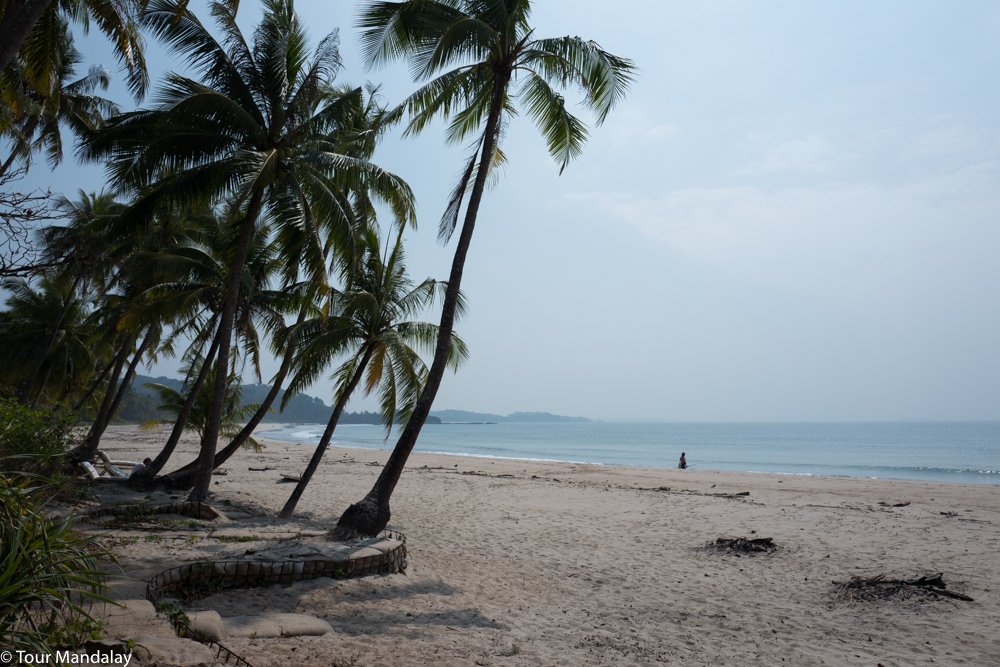
The beach Arakan Nature Lodge opens out onto never fails to provide a welcome introduction.
INTRODUCTION
Located 120km south of Ngapali, you’ll find Arakan Nature Lodge, Myanmar’s first true eco resort and the creation of Ueli Morgenthaler, a former palliative care nurse and massage therapist. Keen to give back to a country he first visited back in 1983, the purpose of this refreshing venture is more for the love of people, nature, health and sustainability than it will ever be for profit. Arakan Lodge’s following four main principles are testament to this.

Ueli Morgenthaler, a former palliative care nurse and the genius behind Arakan Nature Lodge.
1) Run on green technology and practise: This will involve the use of solar power one hundred percent of the time, green water management, eco-dry composting toilets and garbage / grey water recycling.
2) Facilitation of a culturally connected, remote and unobtrusive guest experience: They offer a sense of belonging to an amazing natural and generous space combined with a retreat from the world to reconnect with nature’s most powerful gifts – serenity and adventure.
The safeguarding of the lodge’s unspoilt grounds with an emphasis on nature preservation: Only five trees were cut down during the build, which Ueli still feels guilty about to this day.
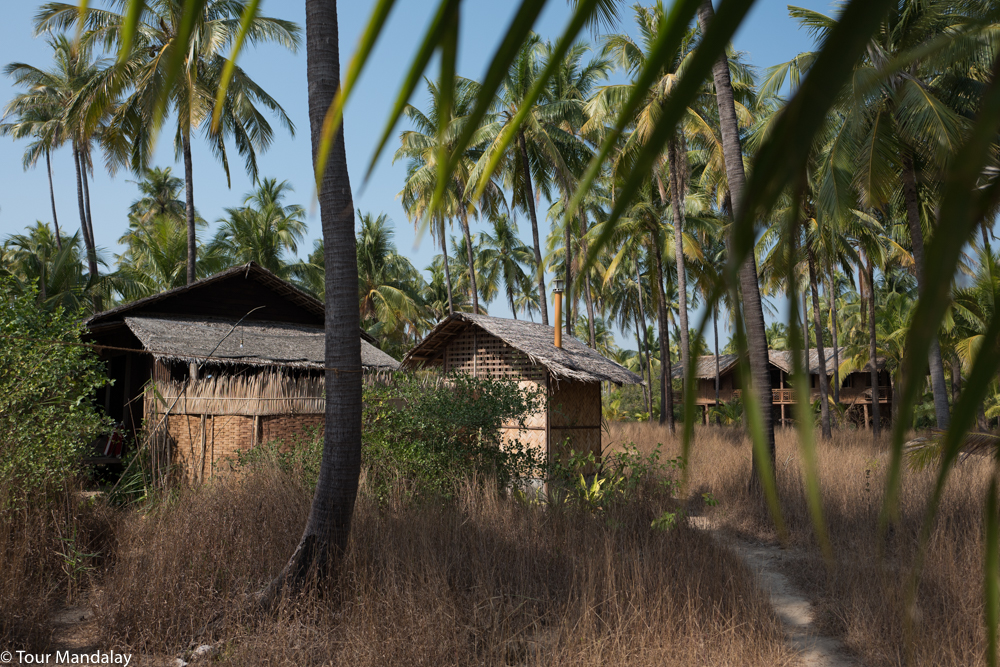
Arakan Nature Lodge’s accommodation blends harmoniously with its natural surrounds.
Engaging with respectful investments and poverty alleviation initiatives in Rakhine State: From the carpenters to the cooks, a large percentage of the money you spend at Arakan Nature Lodge ends up in the hands of the Zikhone village residents.
ACCOMMODATION
With nine bungalows, each unique in style and hand-built by a team of local carpenters, the lodge blends seamlessly with its luscious green surrounds and genuinely feels like an organic extension of the village it’s part of (Zikhone village).
At the time of writing, Arakan Nature Lodge offered three room types.
Arakan Beach House: Suspended on stilts, these beach houses have been constructed using recycled ironwood and bamboo. With an average living space of 34 square metres, combined with a generously proportioned outdoor terrace and bathroom area, the room represents exceptional value for money and is best suited for couples. Thanks to large bamboo lattice windows, multiple roof vents and large shuttered front doors, guests have the option of letting in as much, or as little nature as they want – if the time of year is right, sleeping with everything open comes highly recommended. There’s no choice when it comes to bathing though; although shut off, you’ll have no option other than to bare it all to the trees above.
Arakan Beach House XL: Similar in style to the Arakan Beach House, the XL version offers even more living space but without it feeling excessive. These rooms are best suited for honeymooners, families or a group of friends looking to share. There are three houses of this kind; two are set back inside the coconut palms and one has direct access to the beach. Assignment of these is handled on a first come first serve basis.
Arakan Garden House: Ever wanted to sleep overnight in a treehouse? In the Arakan Garden House room type you get that sense. Elevated high on stilts, the two Arakan Garden House rooms are connected by a communal terrace area with partial sea views. The rooms also have access to their own private balcony areas, although they’re not completely private due to them both looking out over public space. Unlike the beach houses, the toilet and bathroom areas are completely enclosed. Seeing as it is the lowest priced room, this category will suit travellers on a budget, couples, friends, families (you can connect two rooms) and those not comfortable with the thought of showering in the open.
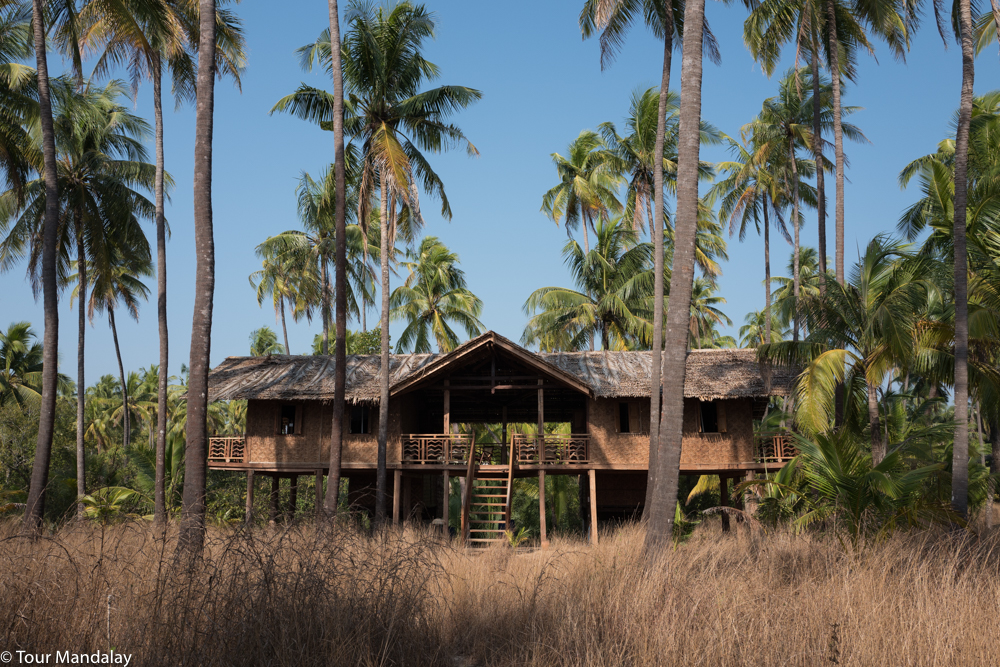
The stilted structure in which the two Arakan Garden Houses are located.
We feel it is important to stress that, even though Arakan Nature Lodge is located in an extremely remote part of the country, it is not the kind of place you go to keep yourself to yourself. In keeping with Ueli’s vision and typical Myanmar village life, it is very relaxed, open and communal in-style. That’s not to say you’ll be treading on your neighbour’s toes; everything is spread out and you effectively have miles of rustic white sand beach to yourself. The scale and beauty of this is breathtaking.
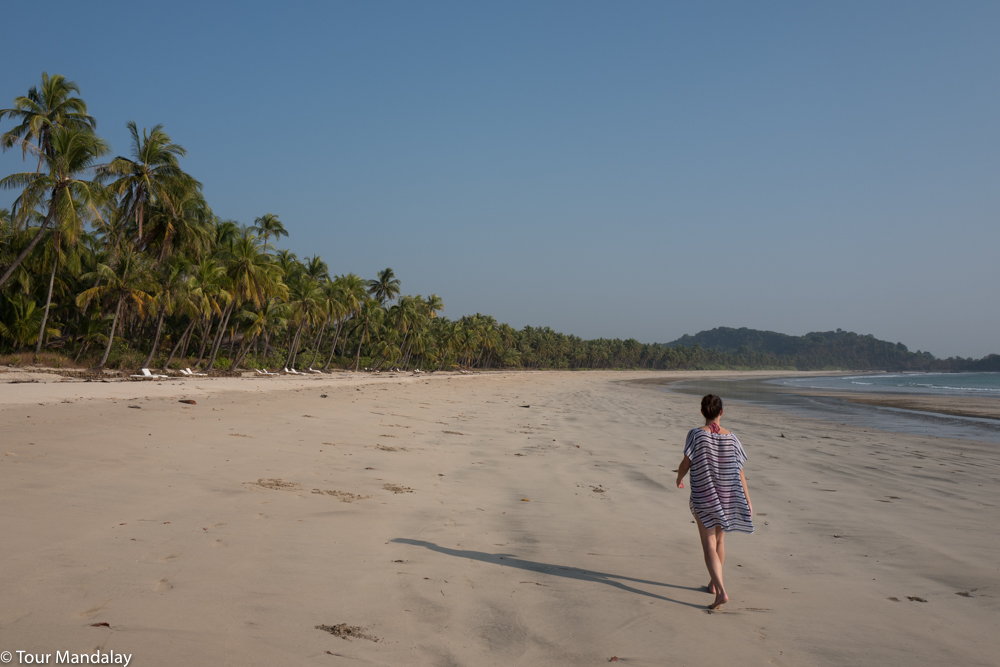
Arakan Nature Lodge likes to encourage guest interaction, but that’s not to say you can’t get plenty of time to yourself.
GREEN TECHNOLOGIES AND PRACTICE
Before continuing, it’s probably best to talk about the white elephant in the room. By that we mean the mention of an eco-dry composting toilet. Just to be clear, Arakan Nature Lodge is an eco property first and foremost; each house is powered 100% by sunlight (using a 6KwP centralised solar system), waste water from the kitchen and laundry is recycled, and dry compositing toilets assist with the production of nutritious and fertile soil.

Not your average toilet cubicle
If you’re not already familiar with how compositing toilets work, here’s a brief explanation sourced from www.eco-toilets.co.uk.
“All composting toilets decompose waste by creating the aerobic conditions for bacteria and other macro and micro-organisms to thrive. The objective is to destroy harmful pathogens, eliminate the risk to human health and environment, and transform the waste nutrients into fertile soil.”
The installation of a dry composting toilet in each house also helps massively with the conservation of water. Did you know the average family of four uses 3335 litres of water per week just by flushing the toilet? If that’s the case, just imagine the amount a hotel or resort uses.
Having spent three nights with a composting toilet, we’re now fully-fledged converts. Due to the wind-powered ventilation system and the breezy nature of the bamboo hut, every sitting was more or less odourless. The special mixture of rice husk, ash and sawdust also helps with this.
In the below video, which we’ve recommend watching from start to finish, Ueli personally explains more about how each of the Swiss manufactured cubicles work (if you’re short of time, please jump to the 09:20 mark).
If the purpose of travel is to challenge yourself, learn and grow, a composting toilet will be sure to help with that. As a bonus, you get the opportunity to give back to nature at the same time. It may sound odd to say, but our experience with this hygienic and environmentally friendly way of disposal turned out to be one of the highlights.
FOOD
Mostly vegetarian and with the occasional addition of fish, breakfast, lunch and dinner were a combination of traditional recipes with the odd western-style side dish. In the mornings fresh bread is prepared using the clay oven and Arakan Nature Lodge encourage eager bakers to lend a hand; the kitchen team appear to have perfected the bake however, so our advice would be to put your feet up and leave them to it. If our French colleagues gave it a thumbs up, we’re confident that you will too.
ACTIVITIES
Concerned that there won’t be enough to do? Think again. The following excursions can be arranged up to 24 hours in advance.
Light circular walk to Forest Hill: This walk is described by Arakan Nature Lodge as being totally local. The circular hike will take you through two types of hill forest; dry deciduous and evergreen. You’ll also pass through rice fields and other mixed use farm land, before reaching a small village pagoda with views across the bay. This is a light but manageable walk with one small, challenging hill climb. Please note: the route in question has a number of permutations, so it is best not to take this description literally.
Arakan Nature Lodge acquired Forest Hill to make up for the amount of fresh wood used during construction. The aim is to protect the area and a visit is offered free of charge to any guests; this helps to ensure the area is constantly watched over. This experience is not offered on a private basis, so there is a chance other guests may end up accompanying you.
Useful information
Recommended departure time: 07:30 or 14:00.
Duration: Three hours plus.
Recommended clothing: Light but sturdy walking shoes. Long, light pants to avoid mosquito bites. A shirt with long sleeves and a hat for sun protection.
Provisions: Light snacks and drinking water.
Boat trip to Gwa Island: Gwa Island can easily be spotted on the distant horizon. It is an uninhabited place with some interesting rock formations. The perimeter can be walked in approximately one hour, alternatively you may wish to snorkel in the area around the anchored boat; the waters are usually very calm so it is ideal for this. The boat used for this is a typical fishing boat and has not been designed with tourism purposes in mind; a noisy diesel engine and basic seating arrangements are to be expected.
Useful information
Boat capacity: Up to 12 people; for smaller groups it is also possible to arrange a boat from Gwa jetty.
Duration: Four and a half hours (approximately three hours for a return boat journey and one and a half hours snorkelling / onshore).
Recommended departure time: 08:30 to 09:00
Recommended clothing: Swimming costume and long sleeve shirt and hat to provide protection from sun.
Provisions: Snorkelling equipment, life vest, drinking water and bananas.
Cost: Approximately USD100 (subject to change).
Other activities, which are slightly more ad hoc in nature include; stand-up paddle boarding, windsurfing, snorkelling, yoga, chasing frisbees, jogging up and down miles of deserted coastline, cycling, ping pong and games of football with the local children. There’s plenty to keep even the most active of travellers occupied.
GETTING HERE
It’s possible to drive (by bus or car) from Yangon to Arakan Nature Lodge; the journey itself will take approximately seven hours and you’ll need to factor in another hour or so for rest stops. This drive is relatively hair-raising in parts and local motorists tend to drive fast, so this is only going to suit those with nerves of adamantium. It is not necessarily the most cost effective option either seeing as you’ll also need to factor in the cost of the driver’s accommodation for the duration of your stay. Unfortunately we cannot vouch for the safety of the public buses either, so if this option appeals, it would need to be arranged independently. For health and safety reasons, Tour Mandalay cannot involve ourselves with this.
Our preferred option, even though it will end up being the most expensive, would be to fly to Ngapali on the first morning flight from Yangon and meet with a local driver. She or he will escort you directly to Arakan Nature Lodge, taking the relatively well-maintained road south to Zikhone. This drive will take approximately four hours to complete; it can be done in less, but Tour Mandalay have purposely asked for it to completed in four as it slows down the pace and helps to ensure a smoother and safer ride.
For the ultimate sense of relaxation and contrast, you could even arrange a few nights in Ngapali at the end.
IS IT SAFE?
We’re conscious that it might seem a bit insensitive to be promoting travel to Rakhine State at this point in time, but please hear us out.
Rakhine is the poorest state in Myanmar and among the most vulnerable to disasters; this explains why one of Arakan Nature Lodge’s core principles is to invest respectfully and develop poverty alleviation initiatives. As a result of tourists coming, the residents of Zikhone village have benefitted from increased employment, awareness of health and safety, understanding of basic hygiene, access to international opinion, learning of languages and the chance to build long-lasting friendships with people from a different culture. If you want the money you spend in Myanmar to really make a difference, a stay at Arakan Nature Lodge is a must. If it works here, there’s a good chance it will lead to similar initiatives being set up in the region, initiatives that will bring with them the benefits mentioned above and most importantly, increased regional exposure.
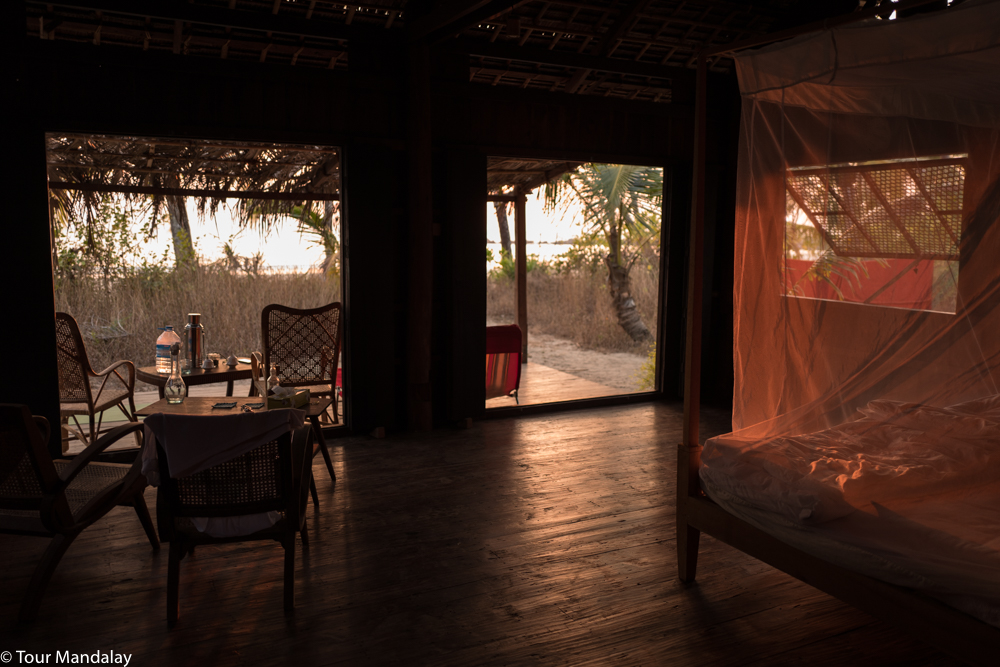
If it helps to reassure you, we slept with the windows and shutter doors open every night.
For clarification on safety, we’d recommend referring to your own country’s international travel advice. The British Foreign Commonwealth Office for example currently states the following:
“The Foreign and Commonwealth Office (FCO) advise against all but essential travel to Rakhine State except the southern townships (administrative areas similar to a borough or county) of Kyaukpyu, Ramree, Munaung, Toungup, Thandwe (including the tourist resort of Ngapali) and Gwa.”
As you can see, Ngapali and Gwa are explicitly mentioned, the former we’ve been sending happy travellers to for decades.
If you would like us to go into more detail about this, please do not hesitate to contact Tour Mandalay’s General Manager, Alex Shaw, by writing to alex@tourmandalay.travel.
IN CONCLUSION
Even with the odds stacked against them, Ueli and his team have succeeded at creating a responsible paradise in a remote part of Myanmar that has long been off-limits to international tourists. As mentioned at the start of this review, the purpose of this venture is more for the love of people, nature, health and sustainability than it will ever be for profit. From the dry composting toilets to the hand-built traditional Rakhine houses to the miles of rustic white sand beach, this is, in our opinion at least, one of the most exciting projects to have graced Myanmar’s travel and tourism industry within the last two decades. Although it’s not going to suit those looking for a polished five-star experience, or anyone looking to keep themselves to themselves, we have every confidence that a stay here will perfectly suit the responsible traveller, the adventurer, and the people who simply want to switch off in the company of other likeminded individuals.
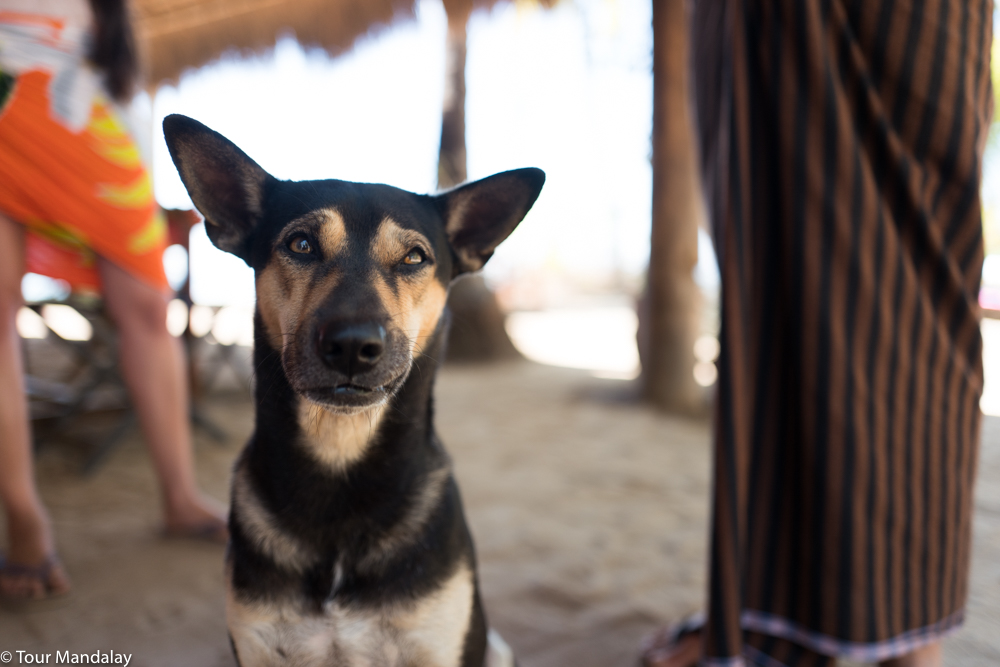
Melo, a friendly rescue dog who’s life was saved by Ueli, looks forward to welcoming you at Arakan Nature Lodge shortly.
This is a once in a lifetime travel experience. We don’t think anymore needs to be said.
